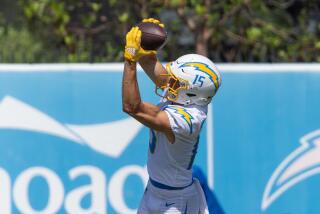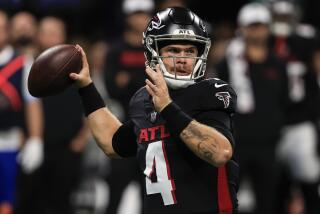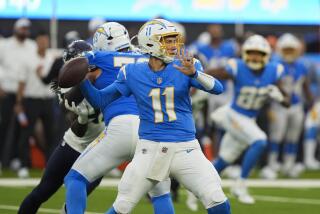In the NFL, Limited Free Agency Is Paying Off : Some of the 617 Unprotected Players Are Reaping a Financial Harvest
SAN DIEGO — For 617 “unprotected” professional football players, most of them on the fringes, free agency is turning out to mean free enterprise.
That includes former Cleveland guard Larry Williams, who, according to the Buffalo News, reached agreement with the Chargers this week after the Browns left him unprotected Feb. 1.
Williams is expected to sign a three-year contract soon for reported base salaries of $275,000, $310,000 and $340,000. The Chargers did not confirm Thursday their intention to sign him. But they didn’t deny it either.
Williams, a 6-5, 290-pound, third-year player from Notre Dame, would be the third unprotected player--all offensive linemen--signed by the Chargers since Feb. 1. Meanwhile, several of the 25 players they left unprotected have set about looking for work.
The football limbo most of these “unprotected” players used to inhabit was always referred to in NFL parlance as “the scrap heap.” Their names tripped across the waiver wires with numbing regularity. Usually this happened only after a team decided it could no longer, in good fiscal conscience, stash one of these players on injured reserve.
Then the league got scared that a federal judge in Minneapolis was going to rule in favor of the players association in a complicated antitrust lawsuit.
So they jury-rigged a hasty form of free agency in which the league’s 28 teams would protect 37 players apiece. On Feb. 1, everybody else--those players from 38 and higher--were free to cut the best deal they could find. Their existing contracts would be binding only if they returned to their original teams. If they signed with a new team, there would be no compensation owed to the old team.
“When it happened, I couldn’t understand why they hadn’t protected me,” said Dan Rosado, who started the last 11 games at center for the Chargers in 1988. “Now I thank them for the opportunity.”
Rosado and his agent, Harold Lewis, are actively peddling his skills on what is more of a flea market than an open market. But it is open. The Lions are the likeliest suitor for Rosado now that Jerry Wampfler, last year’s Charger line coach, has accepted a similar position with Detroit.
Rosado has taken physical examinations in Detroit, Buffalo and Green Bay. He is tentatively scheduled to visit Dallas and Atlanta for more of the same.
“I’m about to glow from all the X-rays,” he says. “And my knees are sore from being twisted.”
But the nibbles are multiplying.
“It’s getting heated out there,” Rosado says. “And the money keeps going up. Hopefully, I can squeeze out a few more dollars.”
Apparently it won’t take much. Last year Rosado made a base salary of $100,000, not bad for an undrafted offensive lineman from Northern Illinois who was out of football for five years before the 1987 strike helped get him back into the league.
But former New Orleans wide receiver Robert Clark, left unprotected by the Saints, doubled his base salary from $100,000 to $200,000 when he signed with the Detroit Lions this week. Clark is only 23 years old. But when the Saints left him off their top 37, his life began at 38. If the Saints had deemed him their 37th most valuable player and therefore protected him, Clark and Ernie Wright, his San Diego agent, would be sitting on their hands.
Kansas City linebacker Todd Howard, unprotected by the Chiefs, recently signed with the Packers for a base salary of $175,000, a signing bonus of $35,000 and a roster bonus of $16,000. If he plays 75 per cent of the Packers’ defensive downs in 1989, he will receive an added $16,000. All this was for a linebacker who has never started a game in the NFL, one who spent much of 1988 nursing an injured knee.
If Howard had stayed in Kansas City, his 1989 base salary and bonuses combined would have been $155,000.
“It’s the first time I’ve ever been in a football negotiation where I’ve had any sort of leverage,” says Stephen Austin, Howard’s agent. “I never had any leverage before.”
To be sure, this is a limited form of free agency. And it does not resemble the free agency that has made millionaires of many major league baseball players with marginal abilities.
“The NFL insults us at every step,” said one NFL quarterback, who asked for anonymity. “This is not free agency. It’s a sham.”
“What we were afraid of was collusion,” says Wright, a former Charger tackle. “Collusion is a very hard thing to prove.”
Last week the NFLPA sent a letter to players and agents warning them to be on guard against collusion.
Through an electronic TWIX machine, each team in the league becomes aware of every player who takes a physical exam with another team. There are no secrets about who may be interested in whom. Still, Wright, who also represents unprotected Charger cornerback Elvis Patterson, chooses not to discuss which teams Patterson has visited.
“The Chargers want Elvis back and he wants to come back,” Wright says.
By leaving Patterson unprotected, the Chargers are gambling no one will sign him. It’s a gamble they will probably win with Patterson and lose with Rosado. Other prominent unprotected Chargers include 1988 starters Ken Dallafior, Vince Abbott, Chuck Faucette and Tyrone Keys.
Both Rosado and Wright say they have seen no evidence of collusion. Wright, like Austin, is rather enjoying himself.
“It’s been a difficult couple of weeks,” he says. “But I’ve been pleasantly surprised at the promptness of the NFL people in returning phone calls.”
Tryouts for unprotected players are rare. “They have all these guys on film,” Wright says. “So, typically, the players fly across the country, take the physical and fly back.”
Rosado likens his visits to college recruiting trips. Austin says they are more like corporate interviews.
Teams are careful to point out the fan support and business opportunities available to players in their city once their careers are over. Visits usually include dinner with the position coach and maybe even a show.
“The teams want to know the person, “ Austin says. “Then, (if they like what they see and hear), they want to sell the person on their team.”
A few players insist their life has not begun at 38. One of them is Charger kicker Vince Abbott, 29, who injured his knee kicking on the poorly maintained grass at Atlanta-Fulton County Stadium Nov. 13. He spent the last five weeks of the 1988 season on injured reserve.
When the Chargers left Abbott unprotected, he was neither surprised nor concerned. For starters, the Chargers also left Steve DeLine, Abbott’s replacement, unprotected.
“If they had protected him, I would have been worried,” Abbott says.
Abbott says his knee has completely healed from the injury. He was alive and well and kicking in Orange County most of February. He arrived in San Diego this week to continue workouts at the Chargers’ stadium practice facility even though his contract has expired.
Before the Chargers announced their protected players, Abbott learned from Steve Ortmayer, the Chargers’ director of football operations, that he would not be on that list. Ortmayer explained to Abbott why the Chargers didn’t think they needed to protect him. Questions raised by the injury were the main reasons cited.
Similarly, a January rotator cuff surgery was the primary reason Cleveland left Williams off their protected list. Browns’ physicians feared Williams wouldn’t be able to play until September. Bills’ doctors in Buffalo also examined Williams and said they believed he would recover much earlier than that.
Abbott says he agreed with Ortmayer and told him he understood why he was unprotected.
“I feel fortunate to have a chance to stay in San Diego,” Abbott says. “Egos tend to get in the way. But I’m just happy to be a Charger.”
Abbott says he hasn’t seriously considered responding to overtures from other teams.
Rosado says coming back to San Diego would be fine with him too. But, he says, “I’m gonna go where I can start and play on a winning team. If it’s here in San Diego, I’d love it. If it’s somewhere else, that’s the way it goes. I’m looking for the best situation; my agent’s looking for the best money.”


